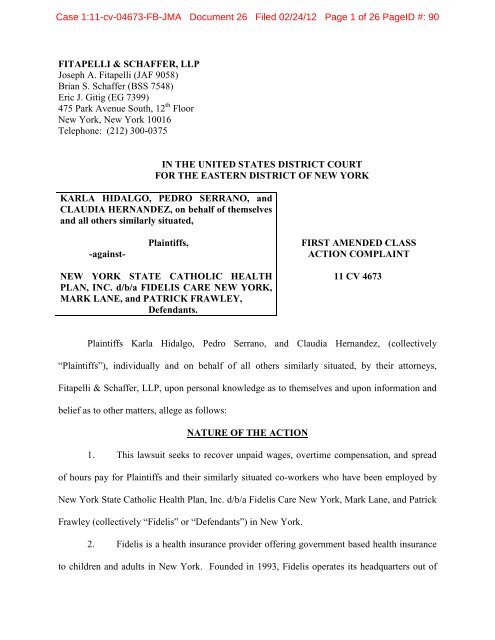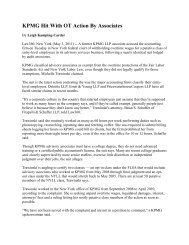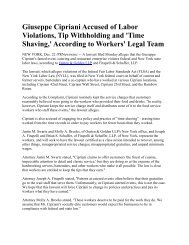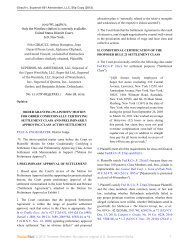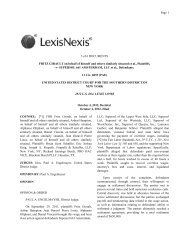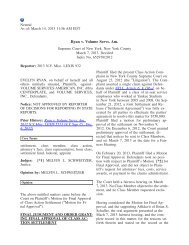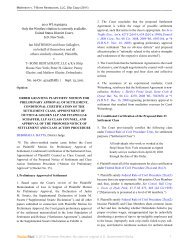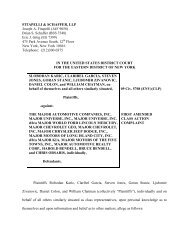You can view the 1st complaint here. - Fitapelli & Schaffer, LLP
You can view the 1st complaint here. - Fitapelli & Schaffer, LLP
You can view the 1st complaint here. - Fitapelli & Schaffer, LLP
Create successful ePaper yourself
Turn your PDF publications into a flip-book with our unique Google optimized e-Paper software.
Case 1:11-cv-04673-FB-JMA Document 26 Filed 02/24/12 Page 1 of 26 PageID #: 90<br />
FITAPELLI & SCHAFFER, <strong>LLP</strong><br />
Joseph A. <strong>Fitapelli</strong> (JAF 9058)<br />
Brian S. <strong>Schaffer</strong> (BSS 7548)<br />
Eric J. Gitig (EG 7399)<br />
475 Park Avenue South, 12 th Floor<br />
New York, New York 10016<br />
Telephone: (212) 300-0375<br />
IN THE UNITED STATES DISTRICT COURT<br />
FOR THE EASTERN DISTRICT OF NEW YORK<br />
KARLA HIDALGO, PEDRO SERRANO, and<br />
CLAUDIA HERNANDEZ, on behalf of <strong>the</strong>mselves<br />
and all o<strong>the</strong>rs similarly situated,<br />
-against-<br />
Plaintiffs,<br />
NEW YORK STATE CATHOLIC HEALTH<br />
PLAN, INC. d/b/a FIDELIS CARE NEW YORK,<br />
MARK LANE, and PATRICK FRAWLEY,<br />
Defendants.<br />
FIRST AMENDED CLASS<br />
ACTION COMPLAINT<br />
11 CV 4673<br />
Plaintiffs Karla Hidalgo, Pedro Serrano, and Claudia Hernandez, (collectively<br />
“Plaintiffs”), individually and on behalf of all o<strong>the</strong>rs similarly situated, by <strong>the</strong>ir attorneys,<br />
<strong>Fitapelli</strong> & <strong>Schaffer</strong>, <strong>LLP</strong>, upon personal knowledge as to <strong>the</strong>mselves and upon information and<br />
belief as to o<strong>the</strong>r matters, allege as follows:<br />
NATURE OF THE ACTION<br />
1. This lawsuit seeks to recover unpaid wages, overtime compensation, and spread<br />
of hours pay for Plaintiffs and <strong>the</strong>ir similarly situated co-workers who have been employed by<br />
New York State Catholic Health Plan, Inc. d/b/a Fidelis Care New York, Mark Lane, and Patrick<br />
Frawley (collectively “Fidelis” or “Defendants”) in New York.<br />
2. Fidelis is a health insurance provider offering government based health insurance<br />
to children and adults in New York. Founded in 1993, Fidelis operates its headquarters out of
Case 1:11-cv-04673-FB-JMA Document 26 Filed 02/24/12 Page 2 of 26 PageID #: 91<br />
Rego Park, New York, with additional offices located throughout New York State.<br />
3. Plaintiffs are hourly employees working for Defendants as Marketing<br />
Representatives.<br />
4. Marketing Representatives at Fidelis are required to perform a multitude of duties.<br />
Primarily, Marketing Representatives are responsible for enrolling eligible individuals into<br />
certain New York State government based health insurance programs. Apart from enrolling<br />
individuals in health insurance programs, Marketing Representatives are also required to attend<br />
health fairs, make corporate office visits, draft expense reports, and act as liaisons with different<br />
departments at Fidelis.<br />
5. Defendants require Marketing Representatives to obtain a minimum of 14 health<br />
insurance applications per week, or secure 24 new members per week to meet <strong>the</strong> minimum<br />
productivity requirements. In order to meet <strong>the</strong>se daunting productivity requirements, as well as<br />
accomplish <strong>the</strong>ir o<strong>the</strong>r responsibilities, Marketing Representatives are often required to work in<br />
excess of 40 hours per week and, at times, in excess of 12 hours per day.<br />
6. Although Marketing Representatives are non-exempt hourly employees entitled<br />
to overtime compensation, Defendants have consistently failed to provide Plaintiffs, and o<strong>the</strong>r<br />
Marketing Representatives, with <strong>the</strong> appropriate pay for all hours worked.<br />
7. In that regard, Defendants time keeping practices are inaccurate, as Defendants<br />
instruct Plaintiffs to record 37.5 hours per week on <strong>the</strong>ir timesheet, regardless of <strong>the</strong> actual<br />
amount of time Plaintiffs work. As a result, Defendants fail to pay Plaintiffs <strong>the</strong>ir proper wages<br />
for hours 37.5 to 40 (2.5) hours, in addition to overtime hours worked over 40 hours per week.<br />
8. Notwithstanding Marketing Representatives being instructed to record only 37.5<br />
hours per week, Fidelis has a policy w<strong>here</strong>by Marketing Representatives are advised <strong>the</strong>y will<br />
- 2 -
Case 1:11-cv-04673-FB-JMA Document 26 Filed 02/24/12 Page 3 of 26 PageID #: 92<br />
receive overtime pay if <strong>the</strong> overtime hours are approved by management. However, when<br />
employees request approval, <strong>the</strong>ir requests are often denied. Upon information and belief,<br />
requests for overtime are denied because management erroneously maintains Marketing<br />
Representatives should be able to accomplish <strong>the</strong>ir productivity requirements by working only<br />
37.5 hours per week.<br />
9. Defendants know or should know that Marketing Representatives <strong>can</strong>not meet <strong>the</strong><br />
stated quotes within 37.5 per week, because <strong>the</strong>ir job duties encompass <strong>the</strong> following:<br />
a. Home Visits<br />
b. Attending Health Fairs<br />
c. Customer Service (including phone calls with appli<strong>can</strong>ts)<br />
d. Screening Appli<strong>can</strong>ts<br />
e. Filling Out and Re<strong>view</strong>ing Applications<br />
f. Making Copies<br />
g. Attending Meetings<br />
h. Driving to/from Locations<br />
i. Preparing Expense Reports (including mileage)<br />
10. Defendants fur<strong>the</strong>r instruct Marketing Representatives that if <strong>the</strong>y were to record<br />
overtime hours on <strong>the</strong>ir timesheets without receiving supervisor approval, <strong>the</strong>y would be<br />
violating Fidelis policies, with ramifications being “disciplinary action up to and including<br />
termination.” As a result of Fidelis’ policies, and fearful of losing <strong>the</strong>ir jobs for not meeting<br />
production requirements, Marketing Representatives indicate 37.5 hours on <strong>the</strong>ir timesheet, even<br />
though <strong>the</strong>y work well over 40 hours per week.<br />
11. Fidelis has actual and/or constructive knowledge of Marketing Representatives<br />
- 3 -
Case 1:11-cv-04673-FB-JMA Document 26 Filed 02/24/12 Page 4 of 26 PageID #: 93<br />
working overtime hours. As an example, when addressing <strong>the</strong> amount of hours necessary to<br />
fulfill Defendants’ production requirements, Angelo Zuffante, a manager, would frequently tell<br />
Marketing Representatives, “Do what you have to do”, knowing that Marketing Representatives<br />
were working in excess of 40 hours per week.<br />
PRIOR LAWSUIT AGAINST FIDELIS<br />
12. In or about January 30, 2007, Thelma Higueros brought suit against Defendants<br />
for failure to pay overtime compensation. See Higueros v. New York Catholic Health Plan, Inc.<br />
d/b/a Fidelis Care, Inc., 07 Civ. 0418 (E.D.N.Y. Jan. 30, 2007). In or about October 2008,<br />
Higueros was certified as a Class Action covering <strong>the</strong> period of January 30, 2001 to January 30,<br />
2007, with notice issued to prospective class members.<br />
13. Upon information and belief, in or about November 2008, Defendants Mark Lane<br />
and Patrick Frawley held a meeting with over one hundred Marketing Representatives to discuss<br />
<strong>the</strong> Higueros Class Action. During that meeting, Defendants intimidated Marketing<br />
Representatives, including Plaintiffs, into opting-out of <strong>the</strong> Higueros Class Action. For example,<br />
Mr. Lane claimed Plaintiff Higueros exaggerated her hours, stating “it was not possible for her to<br />
work so many hours”. Fur<strong>the</strong>rmore, Mr. Lane erroneously told Marketing Representatives that<br />
<strong>the</strong>y had to ei<strong>the</strong>r opt-in or opt-out of <strong>the</strong> lawsuit. Moreover, at one point during <strong>the</strong> meeting,<br />
Mr. Lane warned Marketing Representatives to opt-out if “you don’t want to be involved in a<br />
lawsuit against us [Fidelis].” As a result of Defendants undue influence, Plaintiffs Pedro<br />
Serrano, Karla Hidalgo, and approximately 185 o<strong>the</strong>r Marketing Representatives, opted-out of<br />
<strong>the</strong> Higueros Class Action.<br />
14. Since January 30, 2007, <strong>the</strong> end of <strong>the</strong> class period in Higueros, Defendants have<br />
continued to deprive Marketing Representatives and <strong>the</strong>ir similarly situated co-workers, of<br />
- 4 -
Case 1:11-cv-04673-FB-JMA Document 26 Filed 02/24/12 Page 5 of 26 PageID #: 94<br />
earned hourly and overtime wages.<br />
15. As non-exempt employees, Marketing Representatives are entitled to overtime<br />
premiums for <strong>the</strong> hours <strong>the</strong>y work in excess of 40 in a workweek. By failing to provide such<br />
wages, Defendants uniformly disregarded overtime provisions of <strong>the</strong> FLSA and <strong>the</strong> NYLL,<br />
despite knowledge that <strong>the</strong>ir practices violated <strong>the</strong> law.<br />
16. Plaintiffs bring this action on behalf of <strong>the</strong>mselves and similarly situated current<br />
and former employees of Defendants who elect to opt-in to this action pursuant to <strong>the</strong> FLSA, 29<br />
U.S.C. §§ 201 et seq., and specifically, <strong>the</strong> collective action provision of 29 U.S.C. § 216(b), to<br />
remedy violations of <strong>the</strong> wage-and-hour provisions of <strong>the</strong> FLSA by Defendants that have deprived<br />
Plaintiffs and o<strong>the</strong>rs similarly situated of <strong>the</strong>ir lawfully earned wages.<br />
17. Plaintiffs also bring claims on behalf of <strong>the</strong>mselves and a class of similarly<br />
situated current and former employees who work or worked for Defendants as Marketing<br />
Representatives in New York, pursuant to Rule 23 of <strong>the</strong> Federal Rules of Civil Procedure, for<br />
failure to pay hourly wages, overtime and spread of hours pay in violation of <strong>the</strong> NYLL, Article<br />
6 §190 et seq. and Article 19, § 650 et seq., and <strong>the</strong> supporting New York State Department of<br />
Labor regulations.<br />
Plaintiffs<br />
Karla Hidalgo<br />
THE PARTIES<br />
18. Plaintiff Karla Hidalgo (“Hidalgo”) is an adult individual who is a resident of<br />
Oceanside, New York.<br />
19. Hidalgo has been employed by Defendants as a Marketing Representative from<br />
on or about September 27, 2002 to <strong>the</strong> present, and opted out of <strong>the</strong> Higueros action.<br />
- 5 -
Case 1:11-cv-04673-FB-JMA Document 26 Filed 02/24/12 Page 6 of 26 PageID #: 95<br />
Complaint.<br />
20. Hidalgo is a covered employee within <strong>the</strong> meaning of <strong>the</strong> FLSA and NYLL.<br />
21. A written consent form for Hidalgo was filed with <strong>the</strong> original Class Action<br />
Pedro Serrano<br />
22. Plaintiff Pedro Serrano (“Serrano”) is an adult individual who is a resident of<br />
Elmont, New York.<br />
23. Serrano has been employed by Defendants as a Marketing Representative from in<br />
or about April 2006 to <strong>the</strong> present and, opted out of <strong>the</strong> Higueros action.<br />
Complaint.<br />
24. Serrano is a covered employee within <strong>the</strong> meaning of <strong>the</strong> FLSA and NYLL.<br />
25. A written consent form for Serrano was filed with <strong>the</strong> original Class Action<br />
Claudia Hernandez<br />
26. Plaintiff Claudia Hernandez (“Hernandez”) is an adult individual who is a<br />
resident of Levittown, New York.<br />
27. Hernandez has been employed by Defendants as a Marketing Representative from<br />
on or about January 14, 2008 to <strong>the</strong> present.<br />
Complaint.<br />
Defendants<br />
28. Hernandez is a covered employee within <strong>the</strong> meaning of <strong>the</strong> FLSA and NYLL.<br />
29. A written consent form for Hernandez was filed with <strong>the</strong> original Class Action<br />
30. Defendants New York State Catholic Health Plan, Inc. d/b/a Fidelis Care New<br />
York, Mark Lane, and Patrick Frawley (collectively “Fidelis” or “Defendants”) jointly employed<br />
Plaintiffs and similarly situated employees at all times relevant. Each Defendant has had<br />
- 6 -
Case 1:11-cv-04673-FB-JMA Document 26 Filed 02/24/12 Page 7 of 26 PageID #: 96<br />
substantial control over Plaintiffs’ working conditions, and over <strong>the</strong> unlawful policies and<br />
practices alleged <strong>here</strong>in.<br />
New York State Catholic Health Plan, Inc. d/b/a Fidelis Care New York<br />
31. New York State Catholic Health Plan, Inc. d/b/a Fidelis Care New York<br />
(“Fidelis”) is a domestic business corporation, organized and existing under <strong>the</strong> laws of New<br />
York.<br />
32. Throughout <strong>the</strong> relevant period, Fidelis employed Plaintiffs and similarly situated<br />
employees within <strong>the</strong> meaning of <strong>the</strong> FLSA and NYLL.<br />
33. Fidelis is a covered employer within <strong>the</strong> meaning of <strong>the</strong> FLSA and NYLL and, at all<br />
times relevant, employed and/or jointly employed Plaintiffs and similarly situated employees.<br />
34. At all relevant times, Fidelis maintained control, oversight, and direction over<br />
Plaintiffs and similarly situated employees, including timekeeping, payroll and o<strong>the</strong>r<br />
employment practices that applied to <strong>the</strong>m.<br />
35. Fidelis applies <strong>the</strong> same employment policies, practices, and procedures to all<br />
Marketing Representatives throughout New York, including policies, practices, and procedures<br />
with respect to payment of overtime compensation.<br />
36. At all times relevant, Fidelis’ annual gross volume of sales made or business done<br />
was not less than $500,000.00.<br />
Individual Defendants<br />
New York.<br />
Mark Lane<br />
37. Upon information and belief, Mark Lane (“Lane”) is a resident of <strong>the</strong> State of<br />
38. At all relevant times, Lane has been <strong>the</strong> President and Chief Executive Officer of<br />
- 7 -
Case 1:11-cv-04673-FB-JMA Document 26 Filed 02/24/12 Page 8 of 26 PageID #: 97<br />
Fidelis.<br />
39. At all relevant times, Lane has had power over personnel decisions at Fidelis,<br />
including <strong>the</strong> power to hire and fire employees, set <strong>the</strong>ir wages, and o<strong>the</strong>rwise control <strong>the</strong> terms<br />
and conditions of <strong>the</strong>ir employment.<br />
40. Three to four times per year, Lane conducts “Town Hall” meetings with<br />
employees, including Plaintiffs, in Fidelis offices located throughout New York State. During<br />
<strong>the</strong>se meetings, Lane discusses new initiatives and policies at Fidelis. In November 2008, during<br />
one of Lane’s “Town Hall” meetings, he specifically addressed Fidelis’ overtime policy and <strong>the</strong><br />
Higueros action with Plaintiffs.<br />
41. On or about November 1, 2007, Lane signed and approved a revised Human<br />
Resources Policy and Procedures Manual, outlining Fidelis’ overtime policies related to<br />
Plaintiffs.<br />
42. On June 25, 2011, Lane signed and approved a revised Marketing Representative<br />
Incentive Program. This revised policy for Plaintiffs outlined <strong>the</strong>ir job responsibilities, pay<br />
structure, and incentive goals.<br />
43. At all relevant times, Lane has had power over payroll decisions at Fidelis,<br />
including <strong>the</strong> power to retain time and/or wage records.<br />
44. Lane is actively involved in managing <strong>the</strong> day to day operations of Fidelis.<br />
45. At all relevant times, Lane has had <strong>the</strong> power to stop any illegal pay practices that<br />
harmed Plaintiffs, including policies governing overtime.<br />
Fidelis.<br />
46. At all relevant times, Lane has had <strong>the</strong> power to transfer <strong>the</strong> assets or liabilities of<br />
47. At all relevant times, Lane has had <strong>the</strong> power to declare bankruptcy on behalf of<br />
- 8 -
Case 1:11-cv-04673-FB-JMA Document 26 Filed 02/24/12 Page 9 of 26 PageID #: 98<br />
Fidelis.<br />
Fidelis.<br />
48. At all relevant times, Lane has had <strong>the</strong> power to enter into contracts on behalf of<br />
49. Lane is a covered employer within <strong>the</strong> meaning of <strong>the</strong> FLSA and <strong>the</strong> NYLL, and at<br />
all times relevant, employed and/or jointly employed Plaintiffs and similarly situated employees.<br />
Patrick Frawley<br />
50. Upon information and belief, Patrick Frawley (“Frawley”) is a resident of <strong>the</strong><br />
State of New York.<br />
51. At all relevant times, Frawley has been <strong>the</strong> Executive Vice President and Chief<br />
Operating Officer of Fidelis.<br />
52. At all relevant times, Frawley has had power over personnel decisions at Fidelis,<br />
including <strong>the</strong> power to hire and fire employees, set <strong>the</strong>ir wages, and o<strong>the</strong>rwise control <strong>the</strong> terms<br />
and conditions of <strong>the</strong>ir employment.<br />
53. On or about November 1, 2007, Frawley signed and approved a revised Human<br />
Resources Policy and Procedures Manual, outlining Fidelis’ overtime policies for Plaintiffs.<br />
54. In a declaration dated November 28, 2007, Frawley stated “As <strong>the</strong> Executive Vice<br />
President and Chief Operating Officer, I was <strong>the</strong> Fidelis official who made <strong>the</strong> decision to<br />
terminate Higueros’ employment.”<br />
55. Three to four times per year, Frawley conducts “Town Hall” meetings with<br />
employees, including Plaintiffs, in Fidelis offices located throughout New York State. During<br />
<strong>the</strong>se meetings, Frawley discusses new initiatives and policies at Fidelis. In November 2008,<br />
during one of Frawley’s “Town Hall” meetings, he specifically addressed Fidelis’ overtime<br />
policy and <strong>the</strong> Higueros action with Plaintiffs.<br />
- 9 -
Case 1:11-cv-04673-FB-JMA Document 26 Filed 02/24/12 Page 10 of 26 PageID #: 99<br />
56. In or about February 2010, Frawley had a meeting with Plaintiffs to discuss<br />
Fidelis’ overtime policies. During this meeting, Frawley informed Plaintiffs that reporting<br />
unauthorized overtime could result in termination and that he did not want Plaintiffs asking for<br />
overtime to meet <strong>the</strong>ir goals.<br />
57. On June 25, 2011, Frawley signed and approved a revised Marketing<br />
Representative Incentive Program. This revised policy for Plaintiffs outlined <strong>the</strong>ir job<br />
responsibilities, pay structure, and incentive goals.<br />
58. On August 24, 2011, Frawley re<strong>view</strong>ed and overturned an August 11, 2011<br />
decision to terminate Plaintiff Serrano. In a letter to Plaintiff Serrano, Frawley specifically states<br />
that he is “overturning <strong>the</strong> decision to terminate you [Serrano], and restoring you to your position<br />
with pay for <strong>the</strong> period from August 11th.”<br />
59. In or around August 2011, Plaintiff Serrano made multiple <strong>complaint</strong>s to Frawley<br />
regarding Defendants failure to pay Plaintiff Serrano <strong>the</strong> appropriate overtime wages. In<br />
response to Plaintiff Serrano’s <strong>complaint</strong>s, on September 19, 2011, Frawley sent a letter to<br />
Plaintiff Serrano explaining that he was investigating <strong>the</strong> matter and required more information<br />
from Plaintiff Serrano for his investigations.<br />
60. At all relevant times, Frawley has had power over payroll decisions at Fidelis,<br />
including <strong>the</strong> power to retain time and/or wage records.<br />
61. Frawley is actively involved in managing <strong>the</strong> day to day operations of Fidelis.<br />
62. At all relevant times, Frawley has had <strong>the</strong> power to stop any illegal pay practices<br />
that harmed Plaintiffs, including policies governing overtime.<br />
of Fidelis.<br />
63. At all relevant times, Frawley has had <strong>the</strong> power to transfer <strong>the</strong> assets or liabilities<br />
- 10 -
Case 1:11-cv-04673-FB-JMA Document 26 Filed 02/24/12 Page 11 of 26 PageID #: 100<br />
of Fidelis.<br />
of Fidelis.<br />
64. At all relevant times, Frawley has had <strong>the</strong> power to declare bankruptcy on behalf<br />
65. At all relevant times, Frawley has had <strong>the</strong> power to enter into contracts on behalf<br />
66. Frawley is a covered employer within <strong>the</strong> meaning of <strong>the</strong> FLSA and <strong>the</strong> NYLL, and<br />
at all times relevant, employed and/or jointly employed Plaintiffs and similarly situated employees.<br />
JURISDICTION AND VENUE<br />
67. This Court has subject matter jurisdiction pursuant to 28 U.S.C. §§ 1331 and 1337<br />
and jurisdiction over Plaintiffs’ state law claims pursuant to 28 U.S.C. § 1367.<br />
68. This Court also has jurisdiction over Plaintiffs’ claims under <strong>the</strong> FLSA pursuant<br />
to 29 U.S.C. § 216(b).<br />
69. This Court is empowered to issue a declaratory judgment pursuant to 28 U.S.C.<br />
§§ 2201 and 2202.<br />
70. Venue is proper in <strong>the</strong> Eastern District of New York pursuant to 28 U.S.C.<br />
§ 1391(b)(2) because a substantial part of <strong>the</strong> events or omissions giving rise to <strong>the</strong> claims<br />
occurred in this district.<br />
COLLECTIVE-WIDE FACTUAL ALLEGATIONS<br />
71. Plaintiffs bring <strong>the</strong> First and Second Causes of Action, FLSA claims, on behalf of<br />
<strong>the</strong>mselves and all similarly situated persons who work or have worked for Defendants as<br />
Marketing Representatives in New York who elect to opt-in to this action (<strong>the</strong> “FLSA<br />
Collective”)<br />
72. Consistent with Defendants’ policy and pattern or practice, Plaintiffs and <strong>the</strong><br />
FLSA Collective were not paid hourly pay for hours 37.5 to 40 and premium overtime<br />
- 11 -
Case 1:11-cv-04673-FB-JMA Document 26 Filed 02/24/12 Page 12 of 26 PageID #: 101<br />
compensation for all hours worked beyond 40 per workweek.<br />
73. All of <strong>the</strong> work that Plaintiffs and <strong>the</strong> FLSA Collective have performed has been<br />
assigned by Defendants, and/or Defendants have been aware of all of <strong>the</strong> work that Plaintiffs and<br />
<strong>the</strong> FLSA Collective have performed.<br />
74. As part of its regular business practice, Defendants have intentionally, willfully, and<br />
repeatedly engaged in a pattern, practice, and/or policy of violating <strong>the</strong> FLSA with respect to<br />
Plaintiffs and <strong>the</strong> FLSA Collective. This policy and pattern or practice includes, but is not limited to:<br />
a. willfully failing to pay its employees, including Plaintiffs and <strong>the</strong> FLSA<br />
Collective, hourly pay for hours 37.5 to 40 and overtime wages for hours that <strong>the</strong>y worked in<br />
excess of 40 hours per workweek;<br />
b. willfully failing to record all of <strong>the</strong> time that its employees, including<br />
Plaintiffs and <strong>the</strong> FLSA Collective, have worked for <strong>the</strong> benefit of Defendants.<br />
75. Defendants’ unlawful conduct, as described in this Amended Class Action<br />
Complaint, is pursuant to a corporate policy or practice of minimizing labor costs by having<br />
employees record <strong>the</strong>ir hours inaccurately.<br />
76. Defendants are aware or should have been aware that federal law required <strong>the</strong>m to<br />
pay employees performing non-exempt duties an overtime premium for hours worked in excess<br />
of 40 per workweek.<br />
77. Plaintiffs and <strong>the</strong> FLSA Collective perform or performed <strong>the</strong> same primary duties.<br />
78. Defendants’ unlawful conduct has been widespread, repeated, and consistent.<br />
CLASS ACTION ALLEGATIONS<br />
79. Plaintiffs brings <strong>the</strong> Third, Fourth, Fifth, and Sixth Causes of Action, NYLL<br />
claims, under Rule 23 of <strong>the</strong> Federal Rules of Civil Procedure, on behalf of <strong>the</strong>mselves and two<br />
- 12 -
Case 1:11-cv-04673-FB-JMA Document 26 Filed 02/24/12 Page 13 of 26 PageID #: 102<br />
classes of persons consisting of:<br />
A. All persons who work or have worked for Defendants as<br />
“Marketing Representatives” in New York between January<br />
31, 2007 and <strong>the</strong> date of final judgment in this matter (<strong>the</strong><br />
“Rule 23 Class”).<br />
B. All persons who opted-out of <strong>the</strong> Higueros v. New York<br />
Catholic Health Plan, Inc. d/b/a Fidelis Care, Inc., 07 Civ.<br />
0418 (E.D.N.Y. Jan. 30, 2007)., Class Action, who work or<br />
have worked at New York State Catholic Health Plan, Inc.<br />
d/b/a Fidelis Care New York as Marketing Representatives in<br />
New York between September 27, 2005 to <strong>the</strong> present. (<strong>the</strong><br />
“Rule 23 Sub-Class).<br />
80. Excluded from <strong>the</strong> Rule 23 Classes are Defendants, Defendants’ legal<br />
representatives, officers, directors, assigns, and successors, or any individual who has, or who at<br />
any time during <strong>the</strong> class period has had, a controlling interest in Defendants; <strong>the</strong> Judge(s) to<br />
whom this case is assigned and any member of <strong>the</strong> Judges’ immediate family; and all persons<br />
who will submit timely and o<strong>the</strong>rwise proper requests for exclusion from <strong>the</strong> Rule 23 Classes.<br />
81. The members of <strong>the</strong> Rule 23 Classes are so numerous that joinder of all members<br />
is impracticable.<br />
82. Upon information and belief, <strong>the</strong> size of <strong>the</strong> Rule 23 Classes are at least 50<br />
individuals. Although <strong>the</strong> precise number of such employees is unknown, <strong>the</strong> facts on which <strong>the</strong><br />
calculation of that number depends are presently within <strong>the</strong> sole control of Defendants.<br />
83. Defendants have acted or have refused to act on grounds generally applicable to<br />
<strong>the</strong> Rule 23 Classes, <strong>the</strong>reby making appropriate final injunctive relief or corresponding<br />
declaratory relief with respect to <strong>the</strong> Rule 23 Classes as a whole.<br />
84. Common questions of law and fact exist as to <strong>the</strong> Rule 23 Classes that predominate<br />
over any questions only affecting <strong>the</strong>m individually and include, but are not limited to, <strong>the</strong> following:<br />
(a) whe<strong>the</strong>r Defendants violated NYLL, Articles 6 and 19, and <strong>the</strong> supporting New<br />
- 13 -
Case 1:11-cv-04673-FB-JMA Document 26 Filed 02/24/12 Page 14 of 26 PageID #: 103<br />
York State Department of Labor regulations;<br />
(b) whe<strong>the</strong>r Defendants failed to compensate Plaintiffs and <strong>the</strong> Rule 23 Classes for<br />
hours 37.5 to 40 and hours worked in excess of 40 hours per workweek;<br />
(c) whe<strong>the</strong>r Defendants failed to pay Plaintiffs and <strong>the</strong> Rule 23 Classes spread of<br />
hours pay;<br />
(d) whe<strong>the</strong>r Defendants failed to keep true and accurate time and pay records for all<br />
hours worked by Plaintiffs and <strong>the</strong> Rule 23 Classes, and o<strong>the</strong>r records required by<br />
<strong>the</strong> NYLL;<br />
(e) what proof of hours is sufficient w<strong>here</strong> an employer fails in its duty to maintain<br />
true and accurate time records;<br />
(f) whe<strong>the</strong>r Defendants failed to supply Plaintiffs and <strong>the</strong> Rule 23 Classes with<br />
statements of wages as required by NYLL Article 6 § 195.<br />
(g) whe<strong>the</strong>r Defendants’ policy of failing to pay workers was instituted willfully or<br />
with reckless disregard of <strong>the</strong> law; and<br />
(h) <strong>the</strong> nature and extent of class-wide injury and <strong>the</strong> measure of damages for those<br />
injuries.<br />
85. The claims of Plaintiffs are typical of <strong>the</strong> claims of <strong>the</strong> Rule 23 Classes <strong>the</strong>y seek to<br />
represent. Plaintiffs and all members of <strong>the</strong> Rule 23 Classes work, or have worked, for Defendants<br />
as Marketing Representatives in New York. Plaintiffs and members of <strong>the</strong> Rule 23 Classes, enjoy<br />
<strong>the</strong> same statutory rights under <strong>the</strong> NYLL to be paid for all hours worked, to be paid overtime wages<br />
and spread of hours pay. Plaintiffs and members of <strong>the</strong> Rule 23 Classes have all sustained similar<br />
types of damages as a result of Defendants’ failure to comply with <strong>the</strong> NYLL. Plaintiffs and <strong>the</strong><br />
members of <strong>the</strong> Rule 23 Classes have all been injured in that <strong>the</strong>y have been uncompensated or<br />
under-compensated due to Defendants’ common policies, practices, and patterns of conduct.<br />
86. Plaintiffs will fairly and adequately represent and protect <strong>the</strong> interests of <strong>the</strong><br />
members of <strong>the</strong> Rule 23 Classes. Plaintiffs understand that as class representatives, <strong>the</strong>y assume a<br />
fiduciary responsibility to <strong>the</strong> class to represent its interests fairly and adequately. Plaintiffs<br />
- 14 -
Case 1:11-cv-04673-FB-JMA Document 26 Filed 02/24/12 Page 15 of 26 PageID #: 104<br />
recognize that as class representatives, <strong>the</strong>y must represent and consider <strong>the</strong> interests of <strong>the</strong> class<br />
just as <strong>the</strong>y would represent and consider <strong>the</strong>ir own interests. Plaintiffs understand that in<br />
decisions regarding <strong>the</strong> conduct of <strong>the</strong> litigation and its possible settlement, <strong>the</strong>y must not favor<br />
<strong>the</strong>ir own interests over <strong>the</strong> classes. Plaintiffs recognize that any resolution of a class action must<br />
be in <strong>the</strong> best interest of <strong>the</strong> classes. Plaintiffs understand that in order to provide adequate<br />
representation, <strong>the</strong>y must be informed of developments in litigation, cooperate with class counsel,<br />
and testify at deposition and/or trial. Plaintiffs have retained counsel competent and experienced in<br />
complex class actions and employment litigation. T<strong>here</strong> is no conflict between <strong>the</strong> Plaintiffs and<br />
<strong>the</strong> Rule 23 members.<br />
87. A class action is superior to o<strong>the</strong>r available methods for <strong>the</strong> fair and efficient<br />
adjudication of this litigation. The members of <strong>the</strong> Rule 23 Classes have been damaged and are<br />
entitled to recovery as a result of Defendants’ violation of <strong>the</strong> NYLL as well as its common and<br />
uniform policies, practices, and procedures. Although <strong>the</strong> relative damages suffered by<br />
individual members of <strong>the</strong> Rule 23 Classes are not de minimis, such damages are small compared<br />
to <strong>the</strong> expense and burden of individual prosecution of this litigation. The individual Plaintiffs<br />
lack <strong>the</strong> financial resources to conduct a thorough examination of Defendants’ timekeeping and<br />
compensation practices and to prosecute vigorously a lawsuit against Defendants to recover such<br />
damages. In addition, class litigation is superior because it will obviate <strong>the</strong> need for unduly<br />
duplicative litigation that might result in inconsistent judgments about Defendants’ practices.<br />
88. This action is properly maintainable as a class action under Federal Rule of Civil<br />
Procedure 23(b)(3).<br />
- 15 -
Case 1:11-cv-04673-FB-JMA Document 26 Filed 02/24/12 Page 16 of 26 PageID #: 105<br />
PLAINTIFFS’ FACTUAL ALLEGATIONS<br />
89. Consistent with its policies and patterns or practices as described <strong>here</strong>in,<br />
Defendants harmed Plaintiffs individually as follows:<br />
Karla Hidalgo<br />
90. From in or about October 2005 to in or around 2007, Hidalgo worked over 40<br />
hours per week, with a maximum of approximately 80 hours per workweek for Defendants without<br />
receiving regular pay for hours 37.5 to 40, or overtime compensation for any of <strong>the</strong> hours she<br />
worked over 40 in a workweek.<br />
91. From in or about 2007 to in or around February 2010, Hidalgo worked over 40<br />
hours per week, with a maximum of approximately 57 hours per workweek for Defendants without<br />
receiving regular pay for hours 37.5 to 40, or overtime compensation for any of <strong>the</strong> hours she<br />
worked over 40 in a workweek.<br />
92. Following <strong>the</strong> February 2008 meeting held by Lane and Frawley, Hidalgo opted-<br />
out of <strong>the</strong> Higueros Class Action.<br />
93. From in or around March 2010 to <strong>the</strong> present, Hidalgo worked over 40 hours per<br />
week, with a maximum of approximately 50 hours per workweek for Defendants without receiving<br />
pay for hours 37.5 to 40, or overtime compensation for any of <strong>the</strong> hours she worked over 40 in a<br />
workweek.<br />
94. Defendants were aware that Hidalgo’s position as a Marketing Representative was<br />
non-exempt and that Hidalgo was working well over 40 hours per workweek, yet <strong>the</strong>y failed to<br />
pay her any overtime compensation for any of <strong>the</strong> hours she worked over 40 in a workweek.<br />
95. Defendants did not pay Hidalgo an hourly wage for <strong>the</strong> gap time she worked<br />
between 37.5 hours and 40 hours per week.<br />
- 16 -
Case 1:11-cv-04673-FB-JMA Document 26 Filed 02/24/12 Page 17 of 26 PageID #: 106<br />
96. Defendants did not pay Hidalgo spread of hours pay for all of <strong>the</strong> time that she<br />
worked in excess of 10 hours per day.<br />
97. Upon information and belief, Defendants did not keep accurate records of hours<br />
worked by Hidalgo.<br />
Pedro Serrano<br />
98. From in or about September 2006 to in or about February 2010, Serrano worked<br />
over 40 hours per week, with a maximum of approximately 64 hours per workweek for Defendants<br />
without receiving regular pay for hours 37.5 to 40, or overtime compensation for any of <strong>the</strong> hours<br />
he worked over 40 in a workweek.<br />
99. Following <strong>the</strong> February 2008 meeting held by Lane and Frawley, Serrano opted-<br />
out of <strong>the</strong> Higueros Class Action.<br />
100. From in or about March 2010 to <strong>the</strong> present, Serrano worked over 40 hours per<br />
week, with a maximum of approximately 59 hours per workweek for Defendants without receiving<br />
regular pay for hours 37.5 to 40, or overtime compensation for any of <strong>the</strong> hours he worked over<br />
40 in a workweek.<br />
101. Defendants were aware that Serrano’s position as a Marketing Representative was<br />
non-exempt and Serrano was working well over 40 hours per workweek, yet <strong>the</strong>y failed to pay<br />
him any overtime compensation for any of <strong>the</strong> hours he worked over 40 in a workweek.<br />
102. Defendants did not pay Serrano an hourly wage for <strong>the</strong> gap time he worked<br />
between 37.5 hours and 40 hours per week.<br />
103. Defendants did not pay Serrano spread of hours pay for all of <strong>the</strong> time that he<br />
worked in excess of 10 hours per day.<br />
- 17 -
Case 1:11-cv-04673-FB-JMA Document 26 Filed 02/24/12 Page 18 of 26 PageID #: 107<br />
104. Upon information and belief, Defendants did not keep accurate records of hours<br />
worked by Serrano.<br />
Claudia Hernandez<br />
105. From on or about January 14, 2008 to in or around February 2010, Hernandez<br />
worked over 40 hours per week, to a maximum of approximately 80 hours per workweek for<br />
Defendants without receiving regular pay for hours 37.5 to 40, or overtime compensation for any<br />
of <strong>the</strong> hours she worked over 40 in a workweek.<br />
106. From in or about March 2010 to <strong>the</strong> present, Hernandez has worked over 40 hours<br />
per week, to a maximum of approximately 50 hours per workweek for Defendants without<br />
receiving regular pay for hours 37.5 to 40, or overtime compensation for any of <strong>the</strong> hours she<br />
worked over 40 in a workweek.<br />
107. Defendants were aware that Hernandez’s position as a Marketing Representative<br />
was non-exempt and Hernandez was working well over 40 hours per workweek, yet <strong>the</strong>y failed to<br />
pay her any overtime compensation for any of <strong>the</strong> hours she worked over 40 in a workweek.<br />
108. Defendants did not pay Hernandez an hourly wage for <strong>the</strong> gap time she worked<br />
between 37.5 hours and 40 hours per week.<br />
109. Defendants did not pay Hernandez spread of hours pay for all of <strong>the</strong> time that she<br />
worked in excess of 10 hours per day.<br />
110. Hernandez never received notice of <strong>the</strong> Higueros Class Action.<br />
111. Upon information and belief, Defendants did not keep accurate records of hours<br />
worked by Hernandez.<br />
- 18 -
Case 1:11-cv-04673-FB-JMA Document 26 Filed 02/24/12 Page 19 of 26 PageID #: 108<br />
paragraphs.<br />
FIRST CAUSE OF ACTION<br />
Fair Labor Standards Act – Overtime Wages<br />
(Brought on behalf of Plaintiffs and <strong>the</strong> FLSA Collective)<br />
112. Plaintiffs reallege and incorporate by reference all allegations in all preceding<br />
113. Defendants have engaged in a widespread pattern and practice of violating <strong>the</strong><br />
FLSA, as described in this Amended Class Action Complaint.<br />
114. Plaintiffs have consented in writing to be a party of this action, pursuant to 29<br />
U.S.C. § 216(b).<br />
115. At all relevant times, Plaintiffs and o<strong>the</strong>r similarly situated current and former<br />
employees were engaged in commerce and/or <strong>the</strong> production of goods for commerce within <strong>the</strong><br />
meaning of 29 U.S.C. §§ 206(a) and 207(a).<br />
Defendants.<br />
116. The overtime wage provisions set forth in §§ 201 et seq. of <strong>the</strong> FLSA apply to<br />
117. Defendants are employers engaged in commerce and/or <strong>the</strong> production of goods<br />
for commerce within <strong>the</strong> meaning of 29 U.S.C. §§ 206(a) and 207(a).<br />
118. At all times relevant, Plaintiffs were employees within <strong>the</strong> meaning of 29 U.S.C.<br />
§§ 203(e) and 207(a).<br />
119. Defendants have failed to pay Plaintiffs and o<strong>the</strong>r similarly situated current and<br />
former employees <strong>the</strong> overtime wages to which <strong>the</strong>y were entitled to under <strong>the</strong> FLSA.<br />
120. Defendants’ violations of <strong>the</strong> FLSA, as described in this Amended Class Action<br />
Complaint, have been willful and intentional. Defendants have not made a good faith effort to<br />
comply with <strong>the</strong> FLSA with respect to <strong>the</strong>ir compensation of Plaintiffs and o<strong>the</strong>r similarly<br />
situated current and former employees.<br />
- 19 -
Case 1:11-cv-04673-FB-JMA Document 26 Filed 02/24/12 Page 20 of 26 PageID #: 109<br />
121. Because Defendants’ violations of <strong>the</strong> FLSA have been willful, a three-year<br />
statute of limitations applies, pursuant to 29 U.S.C. § 225.<br />
122. As a result of Defendants’ willful violations of <strong>the</strong> FLSA, Plaintiffs and all o<strong>the</strong>r<br />
similarly situated have suffered damages by being denied overtime wages in accordance with 29<br />
U.S.C. §§ 201 et seq.<br />
123. As a result of <strong>the</strong> unlawful acts of Defendants, Plaintiffs and o<strong>the</strong>r similarly<br />
situated current and former employees have been deprived of overtime compensation and o<strong>the</strong>r<br />
wages in amounts to be determined at trial, and are entitled to recovery of such amounts,<br />
liquidated damages, prejudgment interest, attorneys’ fees, costs and o<strong>the</strong>r compensation pursuant<br />
to 29 U.S.C. § 216(b).<br />
paragraphs.<br />
SECOND CAUSE OF ACTION<br />
Fair Labor Standards Act – Gap Time<br />
(Brought on behalf of Plaintiffs and <strong>the</strong> FLSA Collective)<br />
124. Plaintiffs reallege and incorporate by reference all allegations in all preceding<br />
125. Defendants have engaged in a widespread pattern and practice of violating <strong>the</strong><br />
FLSA, as described in this Amended Complaint.<br />
126. Plaintiffs have consented in writing to be a party of this action, pursuant to 29<br />
U.S.C. § 216(b).<br />
127. At all relevant times, Plaintiffs and o<strong>the</strong>r similarly situated current and former<br />
employees were engaged in commerce and/or <strong>the</strong> production of goods for commerce within <strong>the</strong><br />
meaning of 29 U.S.C. §§ 206(a) and 207(a).<br />
128. The wage provisions set forth in §§ 201 et seq. of <strong>the</strong> FLSA apply to Defendants.<br />
- 20 -
Case 1:11-cv-04673-FB-JMA Document 26 Filed 02/24/12 Page 21 of 26 PageID #: 110<br />
129. Defendants are employers engaged in commerce and/or <strong>the</strong> production of goods<br />
for commerce within <strong>the</strong> meaning of 29 U.S.C. §§ 206(a) and 207(a).<br />
130. At all times relevant, Plaintiffs were employees within <strong>the</strong> meaning of 29 U.S.C.<br />
§§ 203(e) and 207(a).<br />
131. Defendants have failed to pay Plaintiffs and o<strong>the</strong>r similarly situated current and<br />
former employees 2.5 hours per week for hours 37.5 to 40 to which <strong>the</strong>y were entitled to under<br />
<strong>the</strong> FLSA in workweeks w<strong>here</strong> Plaintiffs and class members worked over 40 hours per week.<br />
132. This FLSA gap-time claim is cognizable pursuant to 29 C.F.R § 778.315.<br />
133. Defendants’ violations of <strong>the</strong> FLSA, as described in this Amended Class Action<br />
Complaint, have been willful and intentional. Defendants have not made a good faith effort to<br />
comply with <strong>the</strong> FLSA with respect to its compensation of Plaintiffs and o<strong>the</strong>r similarly situated<br />
current and former employees.<br />
134. Because Defendants’ violations of <strong>the</strong> FLSA have been willful, a three-year<br />
statute of limitations applies, pursuant to 29 U.S.C. § 225.<br />
135. As a result of Defendants’ willful violations of <strong>the</strong> FLSA, Plaintiffs and all o<strong>the</strong>r<br />
similarly situated have suffered damages by being denied pay for hours 37.5 to 40 in accordance<br />
with <strong>the</strong> FLSA and corresponding United States Department of Labor regulations.<br />
136. As a result of <strong>the</strong> unlawful acts of Defendants, Plaintiffs and o<strong>the</strong>r similarly<br />
situated current and former employees have been deprived of 2.5 hours of regular pay for hours<br />
37.5 to 40 and o<strong>the</strong>r wages in amounts to be determined at trial, and are entitled to recovery of<br />
such amounts, liquidated damages, prejudgment interests, attorneys’ fees, costs and o<strong>the</strong>r<br />
compensation pursuant to <strong>the</strong> FLSA and corresponding United States Department of Labor<br />
regulations.<br />
- 21 -
Case 1:11-cv-04673-FB-JMA Document 26 Filed 02/24/12 Page 22 of 26 PageID #: 111<br />
paragraphs.<br />
THIRD CAUSE OF ACTION<br />
New York Labor Law Article 19 – Unpaid Overtime<br />
(Brought on behalf of Plaintiffs and <strong>the</strong> members of <strong>the</strong> Rule 23 Classes)<br />
137. Plaintiffs reallege and incorporate by reference all allegations in all preceding<br />
138. Defendants engaged in a widespread pattern, policy, and practice of violating <strong>the</strong><br />
NYLL, as detailed in this Amended Class Action Complaint.<br />
139. At all times relevant, Plaintiffs and members of <strong>the</strong> Rule 23 Classes have been<br />
employees and Defendants have been <strong>the</strong>ir employer within <strong>the</strong> meaning of <strong>the</strong> NYLL.<br />
employer.<br />
140. Plaintiffs and <strong>the</strong> Class Members are covered by <strong>the</strong> NYLL.<br />
141. Defendants employed Plaintiffs and members of <strong>the</strong> Rule 23 Classes as an<br />
142. Defendants have failed to pay Plaintiffs and <strong>the</strong> members of <strong>the</strong> Rule 23 Classes<br />
overtime wages to which <strong>the</strong>y are entitled under <strong>the</strong> NYLL Article 19 §650 et seq., and <strong>the</strong><br />
supporting New York State Department of Labor Regulations.<br />
143. Defendants failed to pay Plaintiffs and members of <strong>the</strong> Rule 23 Classes, overtime<br />
at a wage rate of one and one-half times <strong>the</strong>ir regular rate of pay.<br />
144. Defendants failed to keep, make, preserve, maintain, and furnish accurate records<br />
of time worked by Plaintiffs and members of <strong>the</strong> Rule 23 Classes.<br />
145. Defendants’ violations of <strong>the</strong> NYLL, as described in this Amended Class Action<br />
Complaint, have been willful and intentional.<br />
146. Due to Defendants’ violations of <strong>the</strong> NYLL, Plaintiffs and <strong>the</strong> members of <strong>the</strong><br />
Rule 23 Classes, are entitled to recover from Defendants unpaid overtime, reasonable attorneys’<br />
fees and costs of <strong>the</strong> action, liquidated damages as provided for by NYLL Article 6 § 198, and<br />
- 22 -
Case 1:11-cv-04673-FB-JMA Document 26 Filed 02/24/12 Page 23 of 26 PageID #: 112<br />
pre-judgment and post-judgment interest.<br />
paragraphs.<br />
FOURTH CAUSE OF AUCTION<br />
New York Labor Law Article 6 – Failure to Pay Wages<br />
(Brought on behalf of Plaintiffs and <strong>the</strong> members of <strong>the</strong> Rule 23 Classes)<br />
147. Plaintiffs reallege and incorporate by reference all allegations in all preceding<br />
148. Defendants have willfully failed to pay Plaintiffs and <strong>the</strong> members of <strong>the</strong> Rule 23<br />
Classes for 2.5 hours worked per week (between 37.5 to 40 hours per week).<br />
149. By Defendants’ failure to pay Plaintiffs and <strong>the</strong> member of <strong>the</strong> Rule 23 Classes all<br />
rightfully earned wages, Defendants have willfully violated <strong>the</strong> NYLL Article 6, §§ 190, 191 et<br />
seq., and <strong>the</strong> supporting New York State Department of Labor regulation.<br />
150. Due to Defendants’ violations of <strong>the</strong> NYLL, Plaintiffs and <strong>the</strong> members of <strong>the</strong> Rule<br />
23 Classes are entitled to recover from Defendants <strong>the</strong>ir unpaid wages, liquidated damages, as<br />
provided for by NYLL Article 6 § 198, reasonable attorneys’ fees, costs, and pre-judgment and post-<br />
judgment interest.<br />
paragraphs.<br />
FIFTH CAUSE OF ACTION<br />
New York Labor Law– Spread-of-Hours Pay<br />
(Brought on behalf of Plaintiffs and <strong>the</strong> members of <strong>the</strong> Rule 23 Classes)<br />
151. Plaintiffs reallege and incorporate by reference all allegations in all preceding<br />
152. Defendants have willfully failed to pay Plaintiffs and <strong>the</strong> members of <strong>the</strong> Rule 23<br />
Classes additional compensation of one hour’s pay at <strong>the</strong> basic minimum hourly wage rate for<br />
each day during which <strong>the</strong>y worked more than 10 hours.<br />
153. By Defendants’ failure to pay Plaintiffs and <strong>the</strong> members of <strong>the</strong> Rule 23 Classes<br />
spread-of-hours pay, Defendants have willfully violated <strong>the</strong> NYLL Article 19, §§ 650 et seq.,<br />
- 23 -
Case 1:11-cv-04673-FB-JMA Document 26 Filed 02/24/12 Page 24 of 26 PageID #: 113<br />
and <strong>the</strong> supporting New York State Department of Labor regulation.<br />
154. Due to Defendants’ violations of <strong>the</strong> NYLL, Plaintiffs and <strong>the</strong> members of <strong>the</strong> Rule<br />
23 Classes are entitled to recover from Defendants <strong>the</strong>ir wages, liquidated damages, as provided for<br />
by NYLL Article 6 § 198, reasonable attorneys’ fees, costs, and pre-judgment and post-judgment<br />
interest.<br />
paragraphs.<br />
SIXTH CAUSE OF ACTION<br />
New York Labor Law– Record Keeping Violations<br />
(Brought on behalf of Plaintiffs and <strong>the</strong> members of <strong>the</strong> Rule 23 Classes)<br />
155. Plaintiffs reallege and incorporate by reference all allegations in all preceding<br />
156. Defendants have willfully failed to supply Plaintiffs and <strong>the</strong> members of <strong>the</strong> Rule<br />
23 Classes with an accurate statement of wages in violation of NYLL Article 6, § 195.<br />
157. Due to Defendants’ violations of <strong>the</strong> NYLL, Plaintiffs and <strong>the</strong> members of <strong>the</strong> Rule<br />
23 Classes are entitled to recover from Defendants one hundred dollars for each work week that <strong>the</strong><br />
violations occurred or continue to occur, or a total of twenty-five hundred dollars, as provided for<br />
by NYLL Article 6 § 198-d, reasonable attorneys’ fees, costs, injunctive and declaratory relief.<br />
PRAYER FOR RELIEF<br />
WHEREFORE, Plaintiffs, individually and on behalf of all o<strong>the</strong>r similarly<br />
situated persons, seeks for <strong>the</strong> following relief:<br />
A. That, at <strong>the</strong> earliest possible time, Plaintiffs be allowed to give notice of this class<br />
action, or that <strong>the</strong> Court issue such notice, to all persons who are presently, or have at any time during<br />
<strong>the</strong> six years immediately preceding <strong>the</strong> filing of this suit, up through and including <strong>the</strong> date of this<br />
Court’s issuance of court-supervised notice, been employed by Defendants as Marketing<br />
Representatives or similarly situated positions. Such notice shall inform <strong>the</strong>m that this civil action<br />
- 24 -
Case 1:11-cv-04673-FB-JMA Document 26 Filed 02/24/12 Page 25 of 26 PageID #: 114<br />
has been filed, of <strong>the</strong> nature of <strong>the</strong> action, and of <strong>the</strong>ir right to join this lawsuit if <strong>the</strong>y believe <strong>the</strong>y were<br />
denied proper wages;<br />
B. Unpaid gap time, overtime pay, and an additional and equal amount as liquidated<br />
damages pursuant to <strong>the</strong> FLSA and <strong>the</strong> supporting United States Department of Labor<br />
regulations.<br />
C. Unpaid agreed to wages, overtime pay, spread of hours pay, and liquidated<br />
damages permitted by law pursuant to <strong>the</strong> NYLL.<br />
D. One hundred dollars for each work week that <strong>the</strong> violations of NYLL Article 6 §<br />
195 occurred or continue to occur, or a total of twenty-five hundred dollars, as provided for by<br />
NYLL Article 6 § 198-d.<br />
E. Certification of this case as a class action pursuant to Rule 23 of <strong>the</strong> Federal Rules<br />
of Civil Procedure;<br />
F. Designation of Plaintiffs as representatives of <strong>the</strong> Rule 23 Classes, and counsel of<br />
record as Class Counsel;<br />
G. Issuance of a declaratory judgment that <strong>the</strong> practices complained of in this<br />
Amended Class Action Complaint are unlawful under <strong>the</strong> NYLL.<br />
H. Pre-judgment interest and post-judgment interest as provided by law;<br />
I. Appropriate equitable and injunctive relief to remedy violations, including but not<br />
necessarily limited to an order enjoining Defendants from continuing its unlawful practices;<br />
J. Attorneys’ fees and costs of <strong>the</strong> action;<br />
K. Such o<strong>the</strong>r injunctive and equitable relief as this Court shall deem just and proper.<br />
- 25 -
Case 1:11-cv-04673-FB-JMA Document 26 Filed 02/24/12 Page 26 of 26 PageID #: 115<br />
Dated: New York, New York<br />
February 24, 2012<br />
Respectfully submitted,<br />
/s Brian <strong>Schaffer</strong> .<br />
Brian S. <strong>Schaffer</strong> (BS 7548)<br />
FITAPELLI & SCHAFFER, <strong>LLP</strong><br />
Joseph A. <strong>Fitapelli</strong> (JF 9058)<br />
Brian S. <strong>Schaffer</strong> (BS 7548)<br />
Eric J. Gitig (EG 7399)<br />
475 Park Avenue South, 12 th Floor<br />
New York, New York 10016<br />
Telephone: (212) 300-0375<br />
Attorneys for Plaintiff and<br />
<strong>the</strong> Putative Classes<br />
- 26 -


